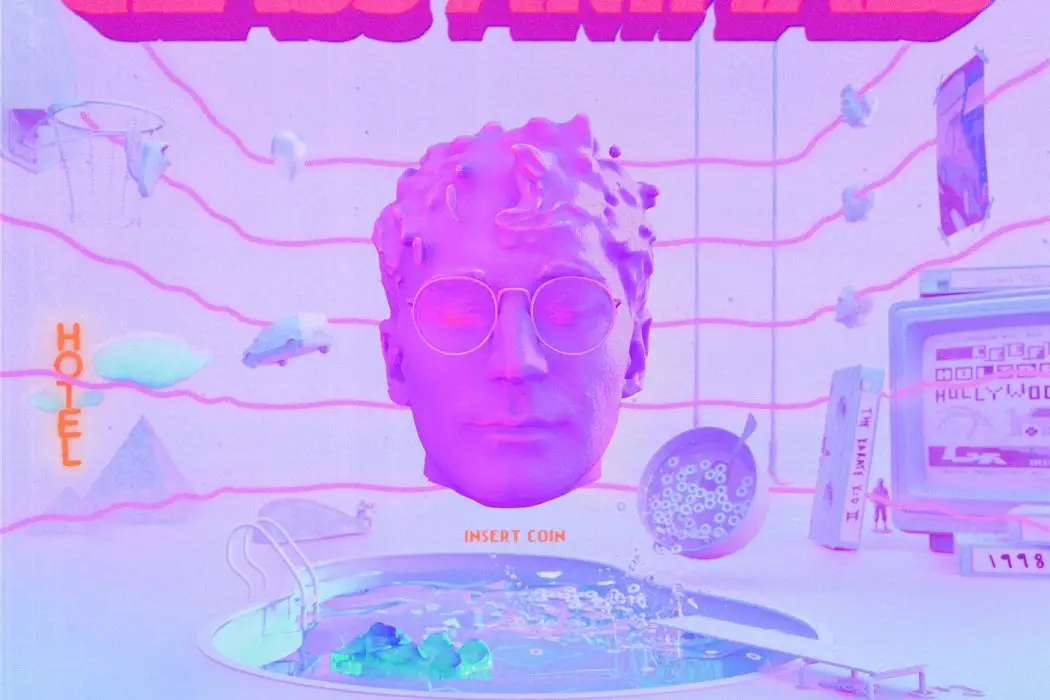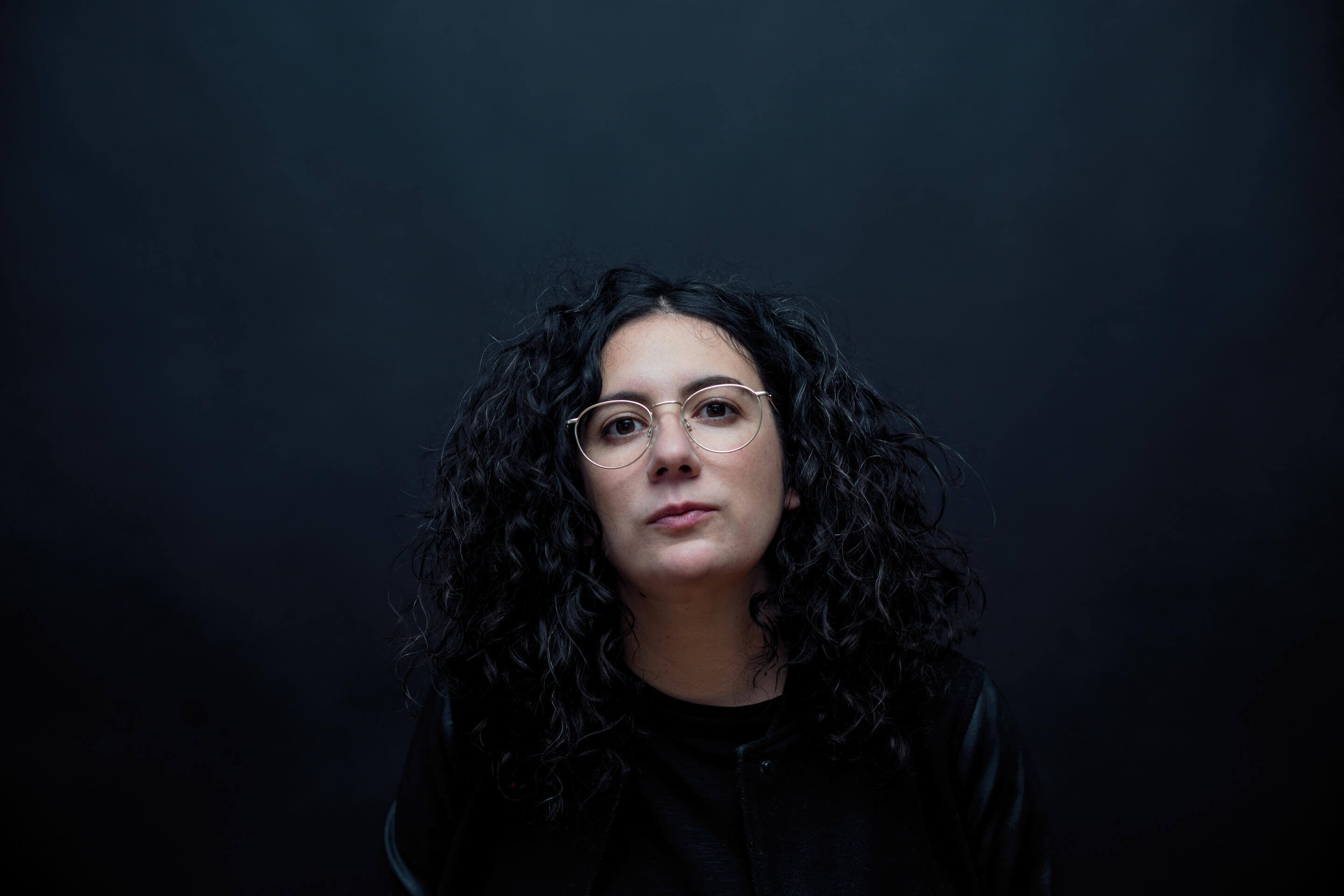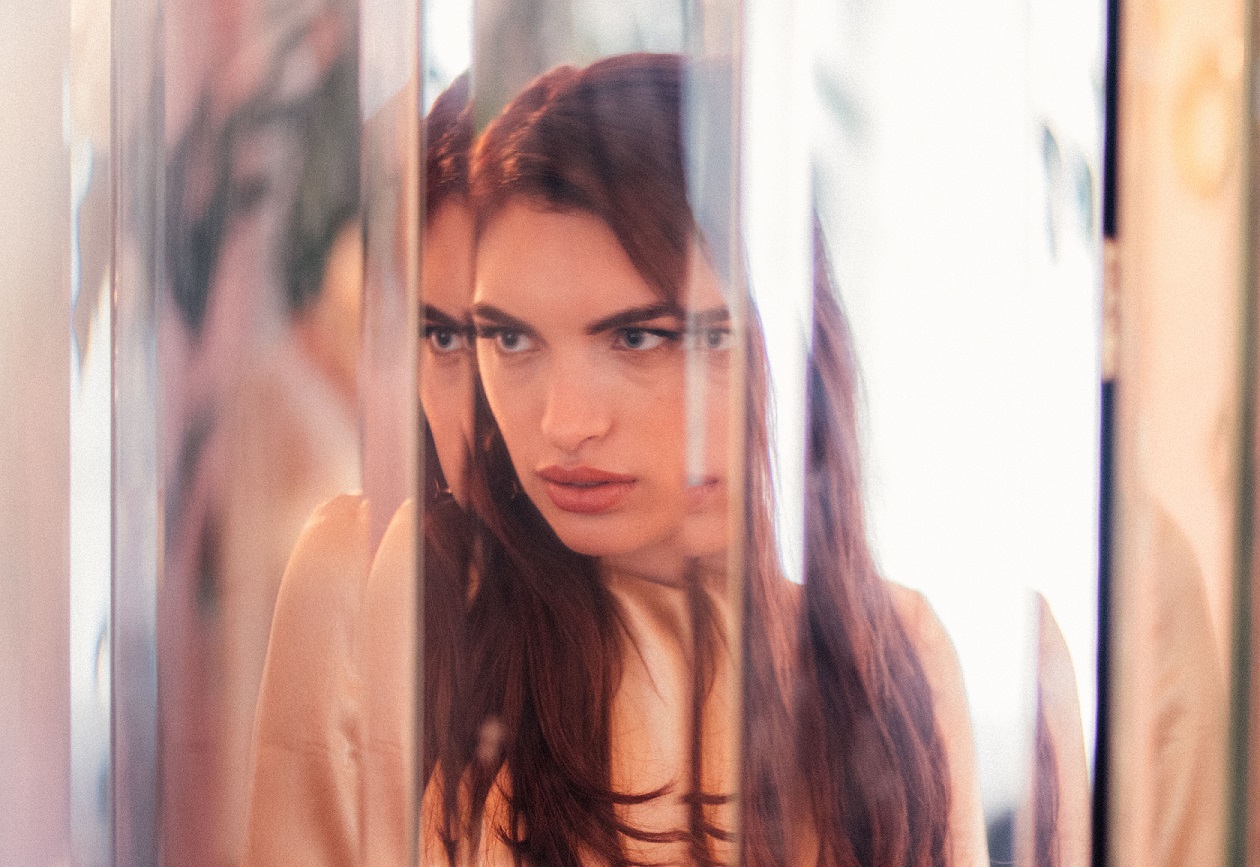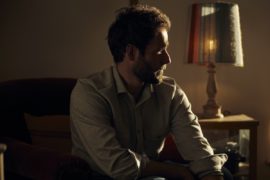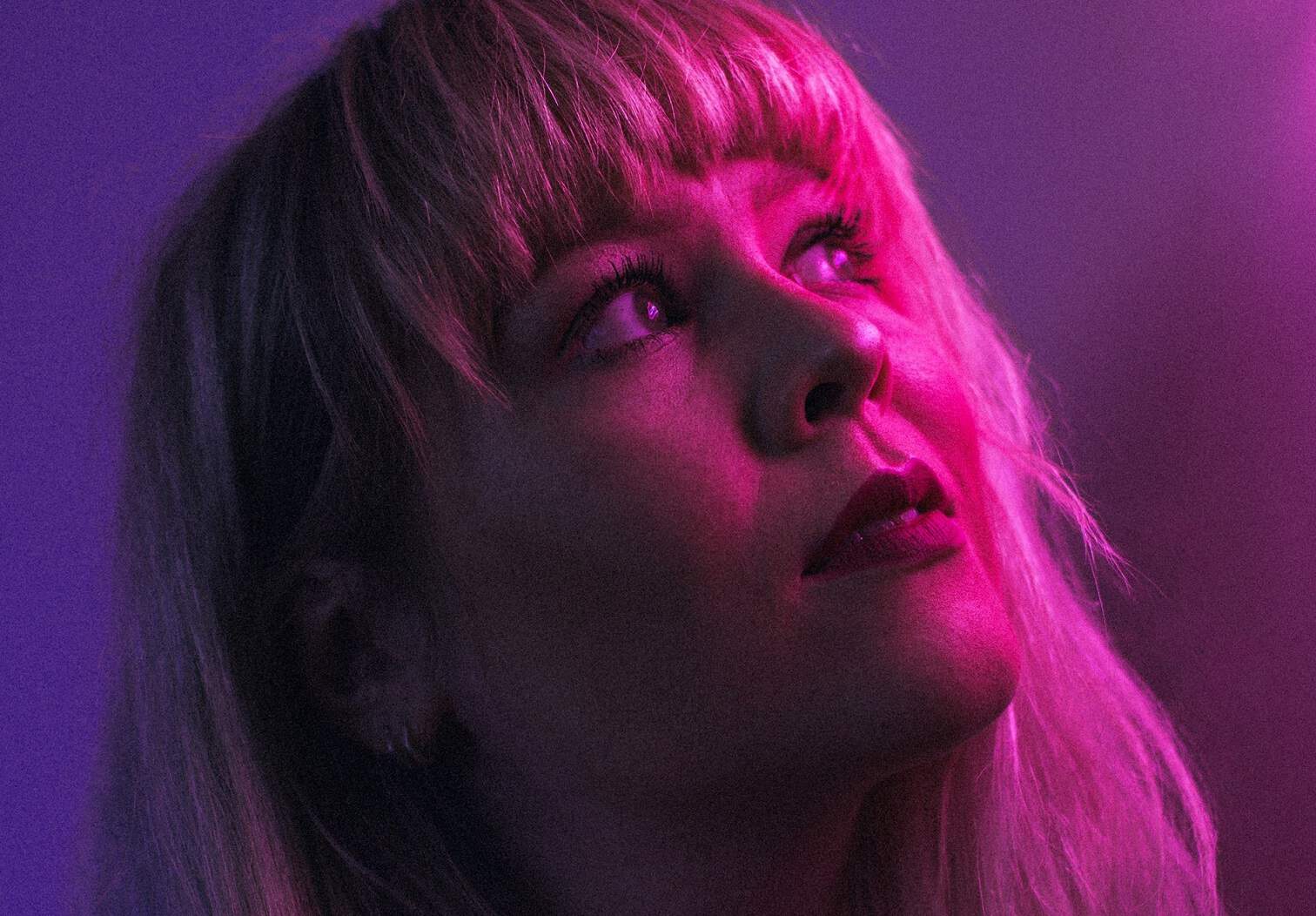Plunge into Dreamland’s intimate depths with Dave Bayley as the Glass Animals frontman discusses memory, lyrical vulnerability and musical therapy, childhood, The Beatles, and a list of songs he lovingly refers to as “Death Jams.”
“It’s All So Incredibly Loud” – Glass Animals
You’re born into naivety and then slowly life picks away at you, and you try to build what you can on top of this really flawed foundation that you have, which is your childhood – and that’s who you are, and it’s not perfect.
Glass Animals’ Dave Bayley dove deeper into himself than ever before when writing what would eventually become his band’s third album.
It was the summer of 2018 when his longtime best friend and bandmate Joe Seaward got hit by a truck while out biking. Suddenly, all of Glass Animals’ plans were halted indefinitely, and Bayley’s focus shifted from exploring space-age sonics to being present with his friend and tuning out the various beeps and drones of medical equipment.
“You go to quite a strange place mentally when you’re in the hospital a lot,” Bayley explains. “I was leaning back into all the nostalgia, the memories and old things, and that’s where I felt comfortable to be.”
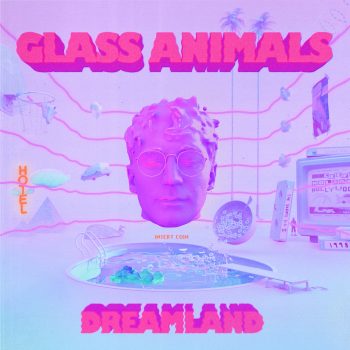
Music has long been a form of therapy for Bayley, and while he coped with his friend’s pain, he began to peel back layers of his own. As images and emotions from his past resurfaced, he found a natural outlet for them in songwriting, especially through lyrics – a space that had once been reserved for more colorful abstraction, yet had, as recently as Glass Animals’ 2016 album How to Be a Human Being, become a venue for increased vulnerability and intimacy.
“There’s personal stuff in there, but the lyrics are very, very abstract with little kind of nuggets of reality in there that are personal, but it’s just so covered over,” Bayley says of the band’s older material.
At first, there wasn’t any specific theme guiding Bayley’s process: He pushed himself to explore moments of trauma and discovery, leaning into “first times” and major milestones. His writing was more personal than any Glass Animals music that had come before, and he wasn’t even sure if these songs were right for the band.
“I dug deep for some of them, and it’s quite uncomfortable territory,” Bayley admits. “Like [the song] ‘Domestic Bliss’ is really uncomfortable territory. It’s not a nice memory – that’s my first memory… [and it] was a really formative memory. That experience definitely changed the way I see the world, and behave, and treat people, and think. That one memory, even though it was like, I don’t know, maybe an hour of my life. It’s quite weird trying to dig that out, trying to remember something like that, ’cause you’ve actually tried quite hard to sort of forget it; it’s not a nice memory. That’s the case with a lot of [Dreamland].”
Despite the pain of reliving certain parts of his past, Bayley soldiered on. “I think I found a lot of comfort in that weird situation, writing some of these [songs]. They definitely took my mind off of the doom that seemed to be the future. I don’t know, I find a lot of comfort making music… Like if I’m ever feeling weird, I make music. I felt f***ing strange for a long time, just ’cause you’re so uncertain.”
I tried to basically make myself feel uncomfortable.
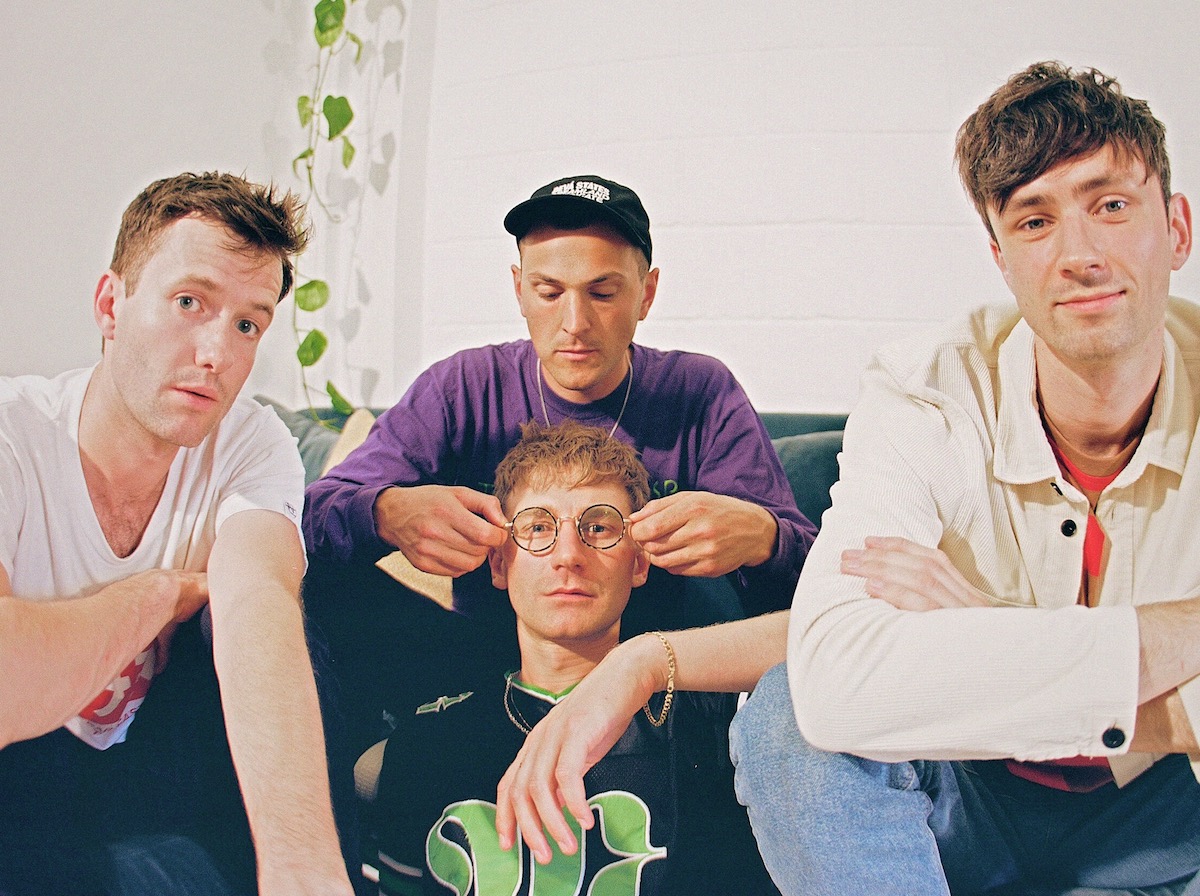
Bayley didn’t know what he was searching for during the creation of Dreamland; all he knew was to keep digging, and to continue unraveling himself. The final product, as described by him and the band, is a journey from one’s first memories up through the present that explores some of life’s big realizations. “Sometimes you don’t fully understand what it is that you’ve learned – you just know,” Bayley says. “That’s the case with ‘Domestic Bliss.’ I really didn’t know what was going on, I was too young – but you know it’s something really awful… You’re confused, but that confusion is enough to change the way that you behave forever.”
With haunting lyrical depth and subtle musical nuance, Dreamland is Glass Animals’ sweeping soundtrack to life’s most intimate, impactful, and universal moments.
The deeply introspective title track “Dreamland” acts as the record’s table of contents, setting the stage for what’s to come with a series of uncomfortable deep dives – many of which are tackled throughout the rest of the album:
That first friend you had, that worst thing you said
That perfect moment, that last tear you shed
All you’ve done in bed, all on Memorex
All ’round-’round your head, all ’round-’round your head
Pullin’ down backstreets, deep in your head
Slippin through dreamland like a tourist
Pullin’ down backstreets, deep in your head
Slippin’ through dreamland like a tourist
You’ve had too much of the digital love
You want everything live, you want things you can touch
Make it feel like a movie you saw in your youth
Make it feel like that song that just unopened you
You were ten years old, holdin’ hands in the classroom
He had a gun on the first day of high school
You want something bizarre, old conceptual cars
You want girls dressed in drag, you want boys with guitars…
– “Dreamland,” Glass Animals
While their subject matter will take time and multiple listens for us to fully process, Glass Animals’ music is uplifting, immersive, and utterly enchanting. The aforementioned “Dreamland” adopts a colorful, mesmerizing canvas of sound that hypnotizes and soothes; in contrast, its follow-up “Tangerine” is a buoyant, saccharine track with a pulsing rhythm, catchy chorus, and feverish lyrical flow. “Hot Sugar” is an intoxicating pastel indulgence weaving vibrant sonic textures through aching vocals and deep grooves, and “Space Ghost (Coast to Coast)” is unapologetic in its compelling marriage of the woozy, the dynamic, and the quirky. Sprinkled throughout the album are four “home movie” snippets, each one featuring a different scene lifted off a VHS tape from Bayley’s youth. These transitions elevate Dreamland‘s already-intimate nature, reminding us once again that though these stories come from Bayley’s head and heart, they belong to all of us now.
Previously-released songs like “Tokyo Drifting” (featuring Floridian Denzel Curry) and Dreamland‘s lead single “Your Love (Déjà vu)” remain high points in the album’s sixteen-track, 45-minute long run; joining them are the entrancing, sun-soaked, and radio-friendly “Heat Waves,” and the torrential “It’s All So Incredibly Loud,” whose sheer intensity goes unmatched: Inner turbulence has seldom manifest itself with the emotional acuity and unrelenting passion displayed throughout this four-minute upheaval.
Then there are moments like “Domestic Bliss (Hawaii),” where Dave Bayley surrenders himself to the raw emotions eating him up inside as together, Glass Animals capture the pain of his darkest and earliest memory:
I see the bruise; I see the truth
I see what he’s been doing to you
Blood on his shoes; what’s his excuse?
he says he’s doing some new kung fu
you always use his bullshit excuse, but
I see what he’s been doing to you
why’d you put up with that shit?
why’d you go back for that kiss?
maybe it tastes like him
when you’ve got tears on your lips
why’d you put up with that shit?
why don’t we pack and leave this
why do you smile when he cries
why do you cry when he wins?
fight for me
we can leave, I’m begging
please, on my knees
go to Hawaii
fight for me…
– “Domestic Bliss (Hawaii),” Glass Animals
This breathtaking, heartbreaking song requires no explanation. It presents Glass Animals at their peak of emotional eloquence and execution, blurring the lines between the cinematic and the intimate through a crushing encapsulation of violence, confusion, and an early loss of innocence.
“It tells lots of small personal stories,” Bayley says in summary. “In terms of a greater picture… All lives just have their own weird path. There are kind of key moments where you learn certain things, that don’t always happen in the same order for everybody. When you first experience death, when you first experience violence, when you first experience change. When you first realize someone that you love is going to hurt you. Sometimes that happens when you’re three, sometimes that happens when you’re 60. Ultimately… I don’t know, I guess some of those things have happened, and that’s here. Maybe some people can see that I’ve survived, and hopefully they’ll be okay too.”
Basically, you’re gonna be very confused and it will be uncomfortable, but that’s actually when the most beautiful things in life happen.
Bayley doesn’t have a neat, pretty ribbon with which to tie Dreamland in a perfect bow; this isn’t that kind of album.
It is, however, a soundtrack to better understanding the things in life that make us who we are. Each of Dreamland‘s songs is like a collection of scars – the results of a life lived. We all have them, but they appear on each of us in different ways and in different places; nevertheless, they are there, seared into us as some of the many cornerstones defining the individuals we are today. It’s incredibly human, and it’s incredibly Glass Animals.
“I guess the goal with this record was to make something that was incredibly honest and incredibly us – personal, sounds like us, feels like us,” Bayley muses. “The words are very from the heart, so much more than the previous records… I hope we’ve achieved that.”
He sits back from his phone and our Zoom call, swiping away messages from his manager and thinking about this third album he and his bandmates have made, a decade into their career. “I think I’ve done it. I’ve got the sounds, most ‘Me’ sounds in there, the sounds that kind of summarize my life so far.”
Dreamland is the deepest dive Glass Animals have ever done, and in turn it is their richest and most meaningful collection to date. Together with his bandmates Joe Seaward, Ed Irwin-Singer, and Drew MacFarlane, Dave Bayley has created another musical masterpiece.
Atwood Magazine plunged into Dreamland‘s intimate depths with Dave Bayley in a conversation about memory, lyrical vulnerability and musical therapy, childhood, The Beatles, and a list of songs he lovingly refers to as “Death Jams.”
— —
:: stream/purchase Dreamland here ::
Stream: ‘Dreamland’ – Glass Animals
A CONVERSATION WITH GLASS ANIMALS
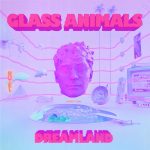
Atwood Magazine: Hey Dave! Before we start, how are you doing? How's your family? How are you holding up through everything that's going on?
Dave Bayley: I think we’re doing alright. My family are okay, thanks for asking. My mum’s just… She got a Netflix subscription, and I haven’t really heard from her since then… [chuckle] Which is good for her! Now, normally I hear from her every four minutes, but she’s been doing her thing… She’s been watching “The Crown,” and that’s all I know. I think she’s alright. My brother, what’s he up to? I don’t know where he is, I speak to him a lot, but he never really tells me much about where he is… I think he’s in the countryside… Staying at a friend’s house in the countryside. The band are all somewhere over there [points behind him]. We’ve just seen each other for the first time in months… It’s nice. Reunited!
Are you sort of now self-quarantining together?
Dave Bayley: No. Everyone lives in different places, and at the beginning of the week, Drew finally came to stay with me. He was quarantining alone and we are finally allowed just to do that, if you were alone. So he came and he’s now living upstairs, so we’ve spent a lot of time together the last couple of days. We can kind of work, socially distanced, and we’ve been rehearsing… A little bit.
That's fantastic. I'm sure that there are shows to come.
Dave Bayley: Yeah, I haven’t seen any of the live-stream shows yet. I need to tune in. We’ve tried a few things, but I don’t know. None of them have felt quite right. I’m a bit… Perfection-y.
No, I know what you mean. It's difficult, especially when you work so hard at crafting a sound, to translate it virtually. Whether it's Zoom or Instagram or Facebook, it's not the same – they're not made to carry music in that way.
Dave Bayley: Definitely not, no. Yeah, I just wanna find a place where the sound is good enough, but also looks right. We’ve toyed with a few places, but we haven’t landed… If we are gonna do it, we are going to do it right.
I hear you and wish you the best in your search. Can we dive right in?
Dave Bayley: Yeah.

I want to start with the big question: How do you think Glass Animals’ music today compares to your music just a few years ago? What's changed?
Dave Bayley: Quite a lot, I think… Firstly, it’s much more personal, which I think is a maturing thing. I’m still really scared about releasing something so personal, but ultimately I think it’s kind of a confidence thing, and that I’ve finally found the right people and had the right people to like, “fucking do it”. And having the right experiences, especially with “Agnes” as a song, and seeing that song’s [impact]. The reaction that song got in live shows and things really pushed me to write more personal stuff. There’s that side of things, and then there’s also… I don’t know, maybe it’s just about being more comfortable in your own shoes kind of thing where, you kind of overcompensate, when you’re not sure what you’re doing, by adding lots and lots of stuff. And you kind of end up muddling everything and having so many ideas. I don’t know, maybe I’ve got a bit more of an assuredness in the best idea. I started working almost subtractively: I throw all the ideas in – there are loads of them – and then I now feel like it’s okay to throw some stuff away, and not put everything into one song… It’s weird… More bold, but also simpler at the same time.
The music definitely feels more ambitious this time around. I know you love to make your own sounds, so let's geek out for a second. What are some of your proudest moments sonically, on this record?
Dave Bayley: Well, there are a lot of like little secret hidden things in this album that I really liked. I don’t know if anyone’s caught some yet, but there’s some hidden messages, and some of the sounds, there’s some sounds that actually… I’m not gonna give too much away, but there are some sounds that can be translated into messages. You might’ve found them I don’t know. And then in terms of really nerdy stuff, I really like the kick drum in the song “Waterfalls…” There’s a little kind of clicky computer sound in “Dreamland” that I really like. I made a lot of this album in headphones in this room here, and I think that kind of contextualizes everything in a funny way, ’cause if you take the headphones off, you kind of hear the computer fan, you hear me clicking a little bit, and like fucking around with a guitar. I like that one. I like the sniff in “Tokyo Drifting.” I like the little ray gun… I’ve got a lot of toys in my studio, and I used a lot of them to make the sounds. There’s a little old kid’s ray gun, at the end of “Space Ghost” just because! I love a lot of the sounds.
I remember you really loved the idea of taping the computer whirr in How to Be a Human Being. When we last spoke a few years ago, you talked about using that on a bunch of different tracks in various ways. You've talked about just now how the chords in “Dreamland” are asking questions and there are messages here and there. Without giving anything away, can you talk about what it means to you to put meaning into music like that? And how you interpret music as language in this other, more hidden way?
Dave Bayley: I think the core of the song has to work, obviously. I also always want the music, the sounds to tell the same story. I dunno, it’s almost like a soundtrack for the lyrics. That’s kind of how I’ve always… It’s kind of how I started seeing things. I actually used to see it the other way around, especially with the first record. A lot of the time the sounds and production came first and the vocal was almost more of like a sound amongst all of those other sounds. I don’t know, around the last record I started thinking more like the sounds are like the soundtrack to what’s happening in the lyrics. And that’s been key on this record for sure. In a lot of the songs, the sounds are very reflective of what I was listening to when I was… It kinda goes through life, this album, and so the sounds are kind of meant to reflect what I was listening to at any given time. The first song is about me being 10, and I thought back to what I was eating and drinking and doing and what being 10 was like, what was on the radio, and what I was listening to – and just put all that in.
Some songs like “Your Love (Déjà vu)” feel like they could serve as crossovers from your last album. Did anything like that actually happen, whether with samples or actual recordings, or is Dreamland all fresh material from 2018 onward?
Dave Bayley: I’m trying to think. It’s all fresh, I think. “Your Love” definitely is the one that nods back to the old stuff the most. Did you feel that?
Oh yeah.
Dave Bayley: I definitely felt that. There are definitely a few musical… “Your Love (Déjà vu)” was meant to have little snippets of… There’s a guitar line in it, that’s meant to sort of reference that guitar line from the first album period. But it’s all about that: It’s all about feeling like you’ve been somewhere before, in that headset before. I think that’s the only instance where something really is meant to lean back into that world.
I love that. How did the process of making Dreamland differ from that of How to Be a Human Being?
Dave Bayley: How to Be a Human Being was really fast. I wanted that one to be a bit more spontaneous, and also I was under pressure to do it that way, because we’d been on tour for ages and then our team – the managers and label – were like, “Let’s get you straight back out on the road.” But then it just happened pretty quickly. If it wasn’t coming out, I probably would have been like, “No, give us a bit of time.” But it came out really fast. I like the spontaneity of it. It’s kind of how it felt being out on tour. You’re waking up in different places. Everything’s very spontaneous. Crazy shit happens. It’s not always perfect. It’s not always good, live music is like that. It’s not totally, totally refined unless you’re playing along to a backing track. And I kind of like the idea of capturing that, and keeping it like that rather than going in with a fine-tooth comb. This one sort of… I refined it a little bit more, especially lyrically. I spent a long time just making sure I was choosing a lot of the right words.
I spent a long time just making sure I was choosing a lot of the right words.
Yeah, it kind of feels like what you used to do with sounds, you now do with lyrics to a greater extent.
Dave Bayley: I started paying a lot more attention to lyrics. I don’t know, I was always really, really obsessed with sounds and I never thought I was very good at the lyrics. And then, I don’t know, people were a bit more encouraging. And when you’re doing a live show and you see people singing the words, you’re like, “Oh I should probably spend a lot more time doing that.”
Glass Animals already had a solid fan base, but the way that your popularity has blown up over the past couple of years, I can't imagine that isn't anything short of re-affirming?
Dave Bayley: It’s weird. I don’t know, we try not to think about it too much. But, yeah. It definitely makes you think you’re doing something right. I don’t know what it is, but we’re doing okay. We’re allowed to make another album. That’s great. Hopefully, there’ll be another one – that’s always the idea.
Exactly, right. So I understand that Dreamland is a personal album, and you've talked about the idea of going from your first memory up until now, through all the big realizations that happen in life. To what extent would you say it's you and your stories compared to previous records?
Dave Bayley: I think there’s a little bit – like, “Agnes” is definitely the only song previously that is straight-up just a personal story. The others, like Zaba was so abstract. There’s personal stuff in there, but the lyrics are very, very abstract with little kind of nuggets of reality in there that are personal, but it’s just so covered over.
It could be in the Tate Modern for sure.
Dave Bayley: Maybe [laughs]. Well, I don’t know about Tate Modern, some kind of weird, dirty East London museum maybe. But then How to Be a Human Being was definitely kind of talking about things I related to in other people. So it’s always kind of been there, the little personal bits, but never as explicit as this. This is very much just like…
You. “Hi, I'm Dave. Here's my story.”
Dave Bayley: It’s a bit weird and it’s quite scary.
Did you go to the band for permission to tell a records’ length tale that's kind of about you? Was that a discussion?
Dave Bayley: I kind of wrote a lot of the stuff and then showed them, and they liked it. Obviously, I didn’t know. I didn’t know what it was gonna be for when I started writing it. Really, I just, I don’t know, I write stuff and then… I didn’t know what we were gonna do. I didn’t know how long it would take for Joe to recover, for instance. So for all I knew, maybe Glass Animals was over, but I didn’t know. So I just kind of started writing, and this album was quite a lot of that.
It sounds like this music came out of a time where you didn't even know if it was gonna be an album at all; it was just really for you.
Dave Bayley: I think so I had this idea for this Dreamland thing. I didn’t know if it was gonna be a Glass Animals album. Sometimes those ideas are just a facilitator to write stuff. They don’t even end up… I have all sorts of them. I had a whole idea that I wanted to do about… I wanted it to be called Happiness, but it was kind of slightly ironic because all the songs were actually really sad. And some of those songs kind of ended up being repurposed into Dreamland. But I don’t know. Yeah, sometimes those bigger ideas end up just being something that helps you write stuff. You can scrap the big idea and keep some of the little ideas.
You do a lot of stuff and then, oh, this works in this new framework.
Dave Bayley: A bit, yeah. And sometimes you just use that big idea to come up with a bunch of sounds and you’re like, “Oh, I found a few sounds that I like. I can strip those out of this song, and start a new song with those sounds, see what happens.”
I love that versatility.
Dave Bayley: Well, it’s just recycling, up-cycling, down-cycling maybe. I don’t know. Maybe the originals were better.
So we talked about “Agnes.” “Agnes” is one of my favorite songs, and I used to wonder if, as How to Be a Human Being's last track, if that might be the springboard into a more personal set of songs. You told me that Dreamland wasn't necessarily originally made with the intent of having this concept. When did the concept of Dreamland come about?
Dave Bayley: It’s basically up until Joe’s accident, I had another idea. I had a couple of other ideas sort of going. All sorts. I was just thinking about doing a whole record about space. I got really obsessed with space and conspiracy theories. I made, I don’t know, I made a bunch of stuff that’s really spacey with all the space-age stints with prophets and… there’s an old Jupiter [synth] over here that I used, amazing little guy. Then basically, he had the accident, and you go to quite a strange place mentally when you’re in the hospital a lot. And all of a sudden, that kind of stuff, especially that quite futuristic stuff, felt really wrong because the future seemed really shitty. I was leaning back into all the nostalgia, the memories and old things, and that’s where I felt comfortable to be. And that’s when I chucked out the old ideas. As he was recovering, I went to do some writing in America for other projects and things. And that’s kind of where the idea started brewing, because it was happening… I was writing those quite personal songs, but for other people. Eventually it just kind of spilled out into writing lots of stuff, and it seemed a very natural direction.
I want to respect your boundaries and personal stuff about Joe. Recognizing that this record was made during a very difficult time, of course, for you and one of your best friend's lives, does that make the music difficult to listen to, and does that create a different relationship with these songs?
Dave Bayley: I think I have a different relationship with these songs, and that’s one of the reasons… They are very personal, I dug deep for some of them. And it’s quite uncomfortable territory, like “Domestic Bliss” is really uncomfortable territory. It’s not a nice memory. That’s my first memory.
In terms of Joe’s accident and how I feel about these songs, yeah, I think… I don’t know if I’ve even ever spoken about them. I think I found a lot of comfort in that weird situation, writing some of these. They definitely took my mind off of the doom that seemed to be the future. I don’t know, I find a lot of comfort making music… Like if I’m ever feeling weird, I make music. I used to sit down on a piano or with a guitar, and I’d immediately feel better.
That's nice. Music is therapy.
Dave Bayley: It is, yeah, and a lot of these songs were that –after Joe’s accident, I felt fucking strange for a long time, just ’cause you’re so uncertain.
When I was young I would go downstairs and just bang on the piano for hours at a time, and my parents would just like, let me get it out there, rather than... Like instead of having tantrums, I would play the piano.
Dave Bayley: That’s it, it’s so therapeutic. I think everyone should have a little outlet like that. I’m very lucky to be able to play a guitar, not particularly well but I can play it. It’s helpful, but everybody probably needs something. Some people go to the gym, I guess, some people go running, some people write, some people… Yeah, play video games.
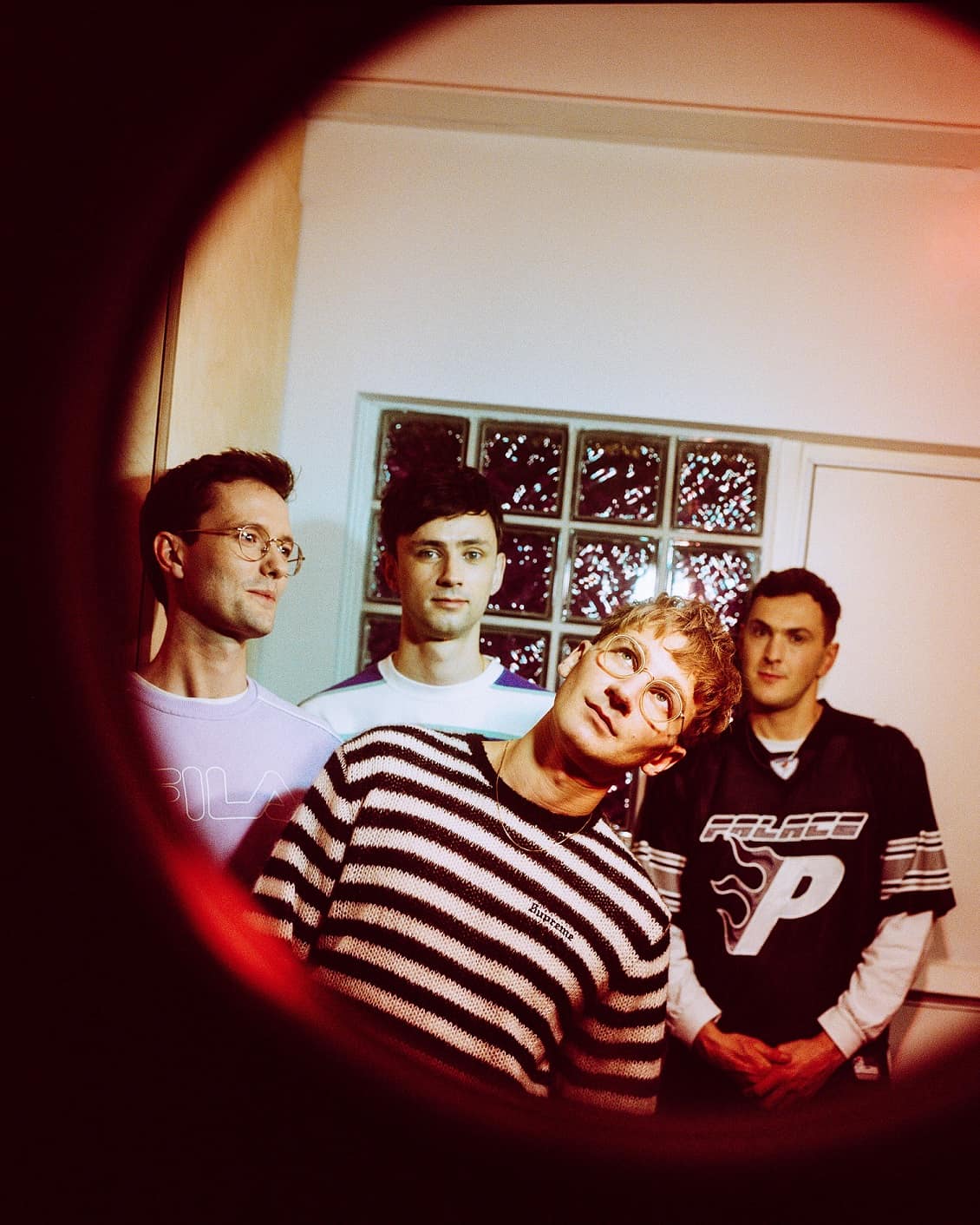
Right. So I had no idea that you spent the first 14 years in the US or that you were a fellow Jew, and I learned all these things only because the album is a personal one, and so the writing about you and your bandmates is becoming more personal as well. How is autobiographical songwriting different from writing songs about other people or the abstract concepts that have graced your music in the past?
Dave Bayley: It’s really nerve-wracking… Especially when you think about the fact that someone might hear it. And you can’t really think about that when you’re actually writing a personal song. Like with “Agnes,” I never really had the intention of anyone… Of that being on an album, it was just something that happened and then I was convinced to. And I definitely don’t regret it. I don’t know, you’re just hyper-protective over everything. I think the boys would definitely agree that I was super protective over all these… Everything that went into these songs, the music, lyrics, sounds, every word. I don’t know, I wanted everything to be right. Sometimes I kept feeling like I couldn’t get vocal takes right and I’d do 50 of them.
Wow.
Dave Bayley: Yeah. Some of them, like “Melon and the Coconut” I tried to do more vocal takes but ended up… That’s literally the demo. I did that song in like… I actually have a video recording of me doing that song ’cause I forgot and had my security camera on in the studio, so the whole day was recorded. It’s like two and a half, three hours of me recording. There’s something about the spontaneity of it that I felt was just right. I tried putting big drums in it, I tried putting big chords in, none of it worked.
I think of “Melon and the Coconut” as one of those songs that couldn't have really existed on past Glass Animals records. It's just a sound that you hadn't yet hit.
Dave Bayley: No. That’s one of the ones that I think yeah, it’s quite ballsy ’cause there’s nothing going on. It definitely took a bit of courage to put that on the record. Normally I like putting in loads of sound effects and big drums to distract you from everything, but it’s…
And it's also smack dab in the middle.
Dave Bayley: Yeah. It’s kind of a… There’s the cassette… Did you hear the cassette sound in the middle when it flips over?
Oh, yeah.
Dave Bayley: I guess, yeah, that’s kind of the point with that song. And I liked putting it in the middle ’cause it’s about these two characters, but really I’ve been both of those characters. I’ve been both of those places, kind of both sides of the argument. I don’t know. And then yeah, then you have the second half of the album. There’s something, I don’t know, symmetrical about that song ’cause it was one verse by the melon one verse by the… Yeah, anyway.
No. I know, I like it a lot. It's like a good halfway point, I think. Whether or not it's actually halfway it works and I enjoyed that feeling of like, “Okay, fresh start. Let's go.”
Dave Bayley: Yeah. Okay, good. I’m glad.
Are there any songs on this record that were particularly hard for you to write?
Dave Bayley: As I said “Domestic Bliss” was really tough.
Those lyrics are really haunting.
Dave Bayley: Yeah. It was quite a weird… ‘Cause you don’t always remember everything. There are lots of pockets of your brain that you’ve just hidden things and buried them under loads of new shit and you kind of forget, but that was a really formative memory. That experience definitely changed the way I see the world and behave and treat people and think. That one memory, even though it was like, I don’t know, maybe an hour of my life. Yeah, it’s quite weird trying to dig that out, trying to remember something like that, ’cause you’ve actually tried quite hard to sort of forget it; it’s not a nice memory. That’s the case with a lot of these… I don’t know, I tried to basically make myself feel uncomfortable. Asked myself really uncomfortable questions, which are all the questions that are in that song “Dreamland,” that opening track. The last time you cried, but what happened to the first friend that you had, and all that. All the weird questions.
You open the record with this cinematic “Dreamland” song, and whisk us into this world full of emotion and wonder. Considering it's something of a patchwork of all the other songs, did this come toward the end of the album process?
Dave Bayley: It was actually… It started first and I remember the day that I started writing that song. I was actually doing a session with… I was doing a session writing for Lianne La Havas. Do you know her?
Yeah.
Dave Bayley: Yeah, she’s amazing. I love her so much, she’s so sweet. We had a great time that day, but she was like 30 minutes late so I started just dicking around piano that they had there. And, yeah, I kind of ended up writing those chords and the first verse. And then we had our session and the next day, I wrote a little bit more to that. And then I just paused it ’cause I knew that was kind of the start of everything. I knew there was enough there and I thought like, “I’ll come back at the end and finish it,” and I did. And that was the last song I finished for the album as well. So it kind of… bookended it. And I remember I was so excited to be recording the last little bit of both while I filmed it. There’s a little… I made a little video of me doing the last vocal recording to the album and I said, “Done.”
I love that feeling. So I really like the next three songs because I feel like they help set the tone for the record. Can you briefly talk about “Tangerine,” “Hot Sugar,” and “Space Ghost (Coast To Coast)”?
Dave Bayley: Yes. “Tangerine,” I love. I think that’s the only song I wrote with someone else on the record, with Starrah, do you know her? She’s my favorite songwriter, modern songwriter. I think she’s incredible. She’s also so nice. And we got into the studio and it just felt right. We’re from the same… We’re both from the northeast of America, I was there until I was seven and then I moved to Texas. And we’re the same age and we just, I don’t know, talked about all sorts of stuff, so we were gonna have a co-writer and she kinda felt right. We did a couple of things actually, we did a lot and some might come out later but just some of it didn’t quite fit into the content. It didn’t fit into this album, but there is a bit more. And it’s just about… I’m sure you’ve had this but someone you know who has changed for some reason. I don’t know, it’s… And you kind of hate the person that they’ve become, but every once in a while, you see a little glimmer of hope, you see that’s the like, “Tiny tangerine freckle painted in your eyes.” That’s it. That’s a little tiny glimpse of who they used to be, and you see that and you latch onto it. And you think, “Oh, there’s still hope of… ” But really they’re gone, they’re changed, that ship has sailed. Yeah, and then there’s a little interlude…
We'll talk about that in a sec.
Dave Bayley: Yeah, that’s just a little short one. Then “Hot Sugar” is… I think that’s my favorite sonically, I wanted that one at the beginning of the record ’cause it is like… It’s all the sounds kind of coming together, all of the sounds of the record. It’s quite mad, lots of strings, lots of really noodle-y strings on the Mellotron. What can I tell you about that one? I guess that one’s actually about something that… About later in life, really. It’s about a relationship, I don’t know… It’s just admiring somebody and confusing that for love or being kind of in awe of someone and thinking that it’s love or… And going with the relationship for that reason, but really it’s just a kind of… You just kinda wanna be like that person ’cause they’re really cool. We’ve all been there. I don’t know, I think that was when I was like 15 or something. “This person’s so cool.” But really it’s just… Yeah, they dress cool, do cool things, and they make you do cool things.
I like how the album is relatable in that way, that you take us through these moments that were important to you but they also... Everybody kind of has them in some shape or form.
Dave Bayley: I think so, I hope so. I mean, I don’t hope so in all ’cause some of these are quite bad, but I think everyone… I don’t know. Definitely, the idea is to keep things just vague enough in the lyrics that maybe people can see someone they know, if not themselves, in it.
At some point, everybody learns about violence; at some point, everybody learns about death.
Dave Bayley: Exactly, yeah, exactly. And sometimes you don’t fully understand what it is that you’ve learned – you just know. That’s the case with “Domestic Bliss”. I really didn’t know what was going on, I was too young – but you know it’s something really awful, and… I don’t know, you’re confused, but that confusion is enough to change the way that you behave forever. It’s mad. Sometimes people say tiny little things, or do tiny little things, or look at you in a certain way, and that changes your life forever. That’s weird.
I'm sorry that you went through that. So at some point, you went to your family's house and asked to see the old VHS collection. What was it like going through those videos with an express purpose? Did you know what you were looking for?
Dave Bayley: I… didn’t, no. So basically, every time I go visit my mom, she brings out these old home movies. She has to hook up this really old DVR into an old TV, and it’s a whole series of cables, and there’s cables all over the place – it’s a mess. So for Christmas, I got all of those put… I sent the tapes off and got them put on USB sticks, so she has them. She can put them in a computer and watch them all. I don’t know, it’s always been a family thing. When me and my brother go visit my mom, she’s like, “Guys, come watch this one.” It’s just like hours and hours and hours and hours of these things. So I got to the end of the album and I had all the instrumental interludes and I figured… I don’t know, it just felt like something was missing. I felt like something… I don’t know. They weren’t all tying together quite right, so I started thinking about what the one thing was that glued all the moments of life together, all the weird ups, downs, sideways space, and the person I called was Mom. She’s been there since day one.
I like that. I think that's really special that you were able to do that, and it just gives that much more meaning to the record, right?
Dave Bayley: I don’t know, but I think so. For me, it makes it really personal because her voice really means something to me.
You definitely feel it as a listener.
Dave Bayley: Oh, good, okay. I didn’t know if it was just a personal thing, but I just thought, “Screw it. It means something to me, and that’s cool. I’m gonna keep it on.”
I think folks will be excited by these interludes. I think they do something to break up the music and it's fun.
Dave Bayley: Oh, I hope so. Yeah, I think I just like hearing my mom’s voice because she’s quite funny. She hated them initially, she really hated them. But I also think her voice does kind of say a lot. There’s a lot in her intonation. When I started taking the audio away from the video and listening really carefully, you can kind of hear… I don’t know. Maybe it’s because I know her so well. You can hear a lot in her voice and her accent I think also says something and the way she speaks. I don’t know, she’s very loving.
A mother's voice.
Dave Bayley: Yeah. [chuckle]
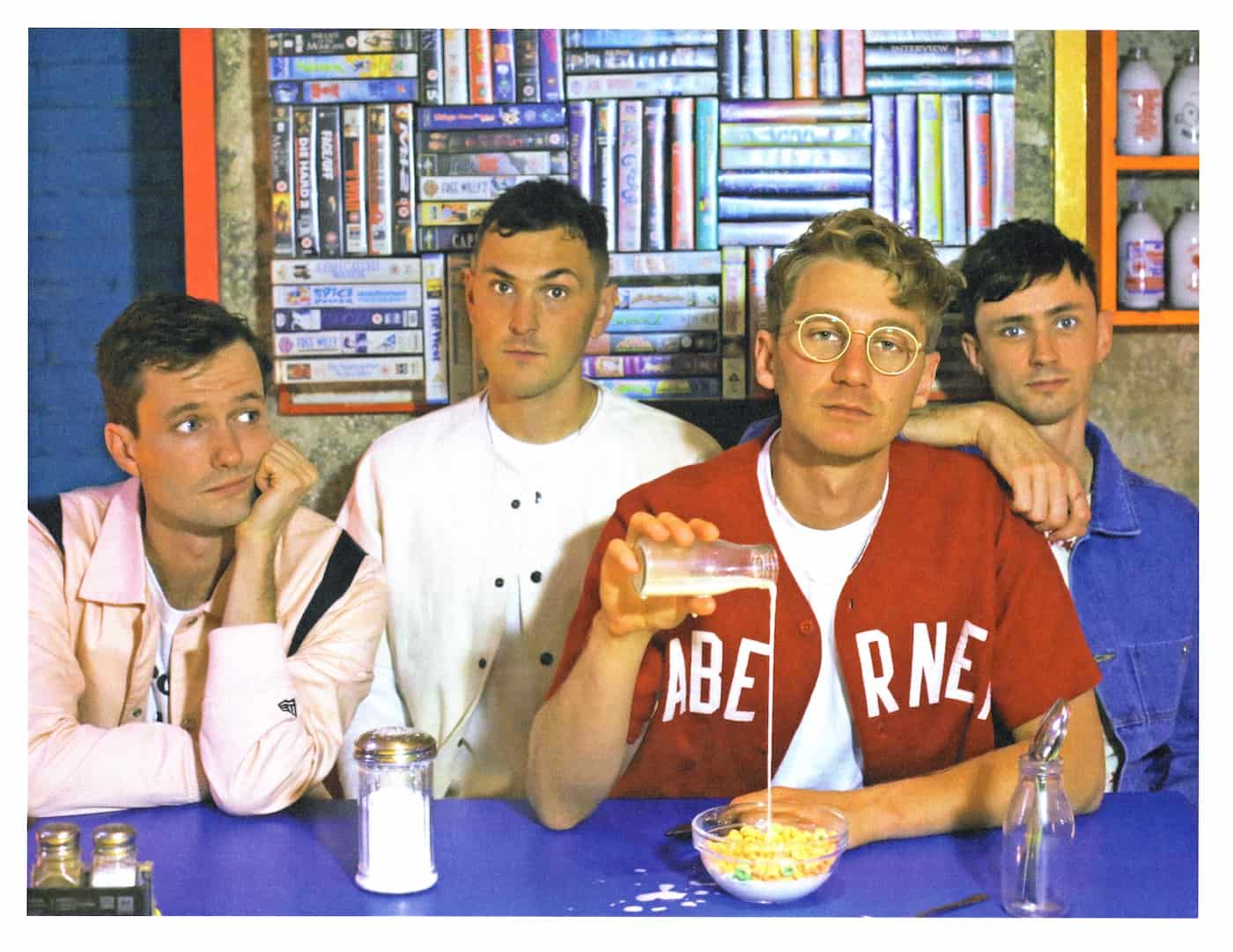
Personally, I find songs like “It's All So Incredibly Loud” and “Helium” quite impressive, just in terms of the scope and depth of music. I don't know if we've touched on this yet, but do you have any personal favorite songs off this album? I know that's one of the harder questions that artists get asked.
Dave Bayley: I think those are probably the two! [laughs]
Really?!
Dave Bayley: Yeah. [laughs] Weird. Are those your favorites, is that what you were saying?
Yeah.
Dave Bayley: Oh, weird. Yeah, I think those are my two favorites actually. I’ve been thinking about it for a while. I like those two a lot. Sonically, I like “Hot Sugar” and “Space Ghost” but there’s something, I don’t know, there’s something about those two tracks that I think just… I don’t know. They’re not very comfortable songs, they’re pretty uncomfortable and I think it’s just ’cause they… I don’t know, they make me feel something.
Me too.
Dave Bayley: I really like them.
I think “It's All So Incredibly Loud” goes from nothingness to these big beats at the very end, right? It's brilliant. And “Helium,” I mean, to me, it sounds like you're on your way to making your own “Bohemian Rhapsody,” you know what I mean? It's an art piece.
Dave Bayley: Well, it’s lot sadder – maybe. I don’t know. I guess I was trying to do something that could work at the end of the album with that one. And I was trying to think of what the sentiment was at the end of the album. And really, the sentiment is that it’s like it’s kind of okay to be quite… It’s okay to be really uncertain, and be confused. And life isn’t perfect; it’s kind of all over the place. You have these big shifting, seismic moments, and that’s sort of what that song is meant to encapsulate. It’s uncomfortable a lot of the time, and there are moments of beauty and moments of… I don’t know. It’s meant to just go kind of fit everything into one. And that’s kind of what the last line is saying. You kind of start off as this… I don’t know. You’re born into naivety and then slowly life picks away at you, and you try to build what you can on top of this really flawed foundation that you have, which is your childhood – and that’s who you are, and it’s not perfect.
I like how that song has kind of multiple endings. There have been various times where I would look down at my phone and say, “Oh. It's done,” and then I’d just get surprised.
Dave Bayley: Yeah?! That’s good. Okay, I’m glad. I didn’t know if anyone would actually get to the… I know peoples’ attention, everything’s a click away. I thought as soon as people heard silence, they’d click. But that’s good. I’m glad.
I'm excited to sit with that one more because I feel like that one is probably... Your final songs seem to have always had some meaning, some purpose – you like to end with purpose. Like you just said, you were trying to summarize what this whole thing meant to you, why did you go through this exercise? And “Helium” is kind of our way out back into reality. I'm not there yet, personally; I haven't yet fully grasped it – the fullness of that song – and I kind of like that I haven't gotten there...
Dave Bayley: Oh. Yeah. Well, I think that’s kind of the point… Well, the whole song was rearranged at one point, like the guitar part started at the beginning. And then I just… The really soft guitar…
Yeah. I really like that part.
Dave Bayley: Yeah, me too. I kind of wanted it to feel, feel really up in the air ’cause that’s why… I don’t know, I don’t I feel like… I’m not relatively young-ish. I don’t know if I’m ever gonna be wise, and understand anything, and I think that… I don’t know, that’s what that song’s… It’s meant to make you feel quite uncomfortable and a bit of a loose end.
Yeah. Well yeah, I think it's cool that you were able to come to some sort of conclusion... Whether or not it's comfortable, it's meaningful.
Dave Bayley: I guess so. I guess the conclusion is that… Yeah, there is no conclusion. [laughter]
Yeah. Right. Life just keep going. You never get to stop and really think about these things. You can stop and think about them, but life is gonna keep moving as you do it.
Dave Bayley: That’s it. Yeah, and you might as well just roll with the confusion… Basically, yeah. Basically, you’re gonna be very confused and it will be uncomfortable, but that’s actually when the most beautiful things in life happen. I don’t think I’ve ever actually said that before in a nice enough way, but that seemed to work. [laughter]
I'll shoot it your way if you want. So at the end of the day, we have this story that is your life, in some semblance or fashion. What story does Dreamland tell for you, that you can now say you've shared with the world?
Dave Bayley: I don’t know, I mean… I’m trying to think. It tells lots of small personal stories, in that sense. In terms of a greater picture… All the small personal stories are there in the songs. I’m not trying to say I have a particularly unusual life, or a particularly difficult life. People have had much more difficult experiences, I’m sure. But what… I don’t know, I guess… Just sharing a life, I think probably follows… All lives just have their own weird path. And sometimes you don’t get to those places… There are kind of key moments where you learn certain things, that don’t always happen in the same order for everybody. When you first experience death, when you first experience violence, when you first experience change. When you first realize someone that you love is going to hurt you. Sometimes that happens when you’re three, sometimes that happens when you’re 60. Ultimately… I don’t know, I guess some of those things have happened, and that’s here. Maybe some people can see that I’ve survived, and hopefully they’ll be okay too.
You put a ribbon on it at the end, nice!
Dave Bayley: I try. [laughter]
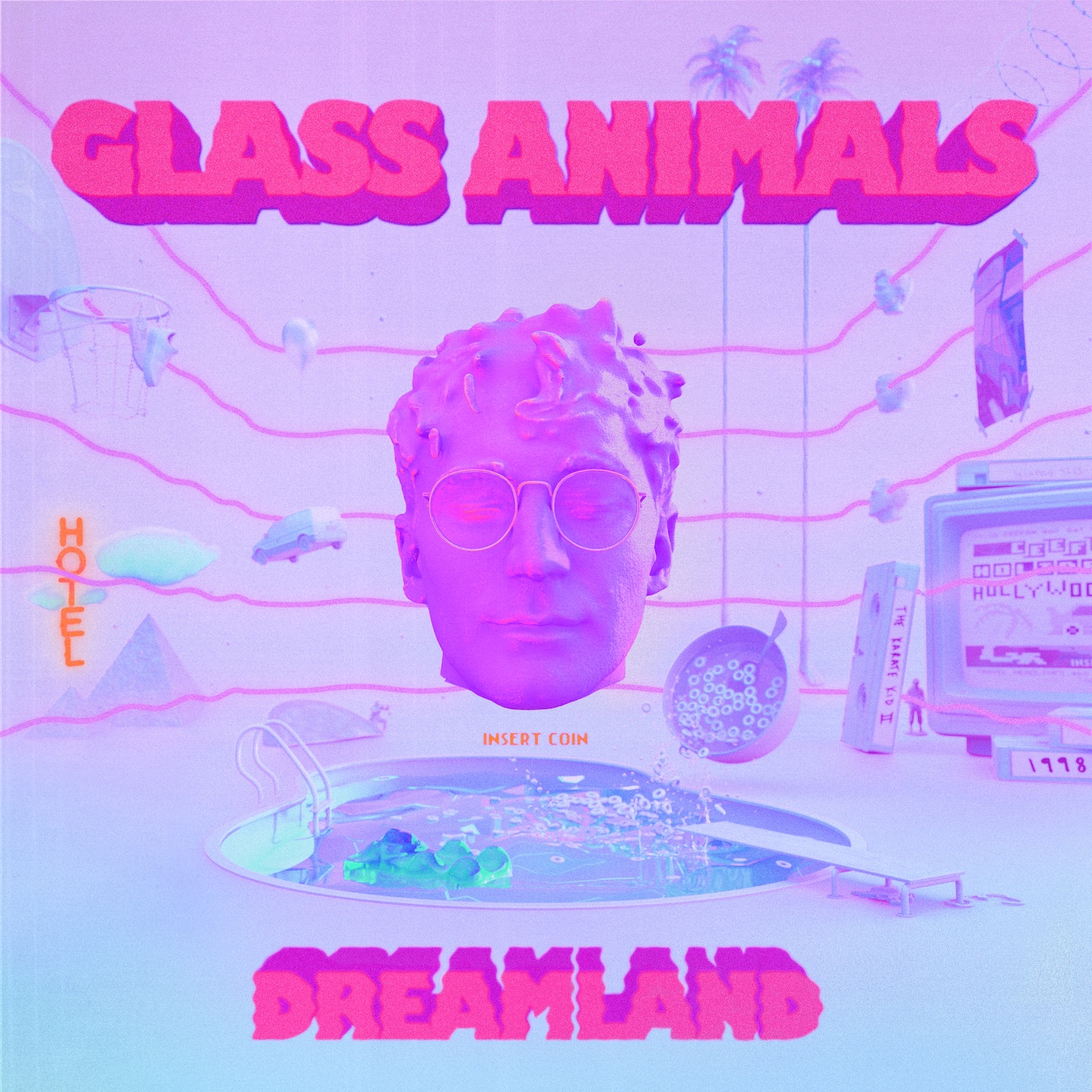
So you took me through Dreamland, thank you! One of the things that I always think about, especially when a band come to their third album… Is that you have your entire life to write your debut, and then there's this rush to make album number two. You had time to make this third record and... A lot of times artists will look back at their third record as the one they say, “This was my big achievement,” at least at the beginning of their career. Do you feel like you achieved what you set out to accomplish in Dreamland? And what most excites you about having this album out in the world?
Dave Bayley: I think I set out to achieve it. I’m not… I’m still very close to everything, and I hope I keep… As a group, we keep improving, and getting better at making better music. But I guess the goal with this record is to make something that was incredibly honest and incredibly us – personal, sounds like us, feels like us. The words are very… From the heart, and hurt. So it’s definitely, so much more than the previous records… I hope we’ve achieved that. I kind of need to step back. I’ve just been so ingrained in the details of it. And after the music’s written, there’s all the artwork that… Making the vinyl, doing the poster design… Stuff, CD design… All this stuff. I actually haven’t listened to it properly in a couple of weeks. I should probably do that and see how I feel. Sitting back… The last time I listened to it, I was like, “I think I’ve done it, I’ve got the sounds, most ‘Me’ sounds in there, the sounds that kind of summarize my life so far.”
This represents you right now.
Dave Bayley: I think so. It will probably change. [laughter] The goal was, sonically, to get all of the sounds that I grew up with, and find a way to make a hybrid, and I think I’ve done it. At least in certain cases like “Hot Sugar,” I think I really, I got it. It’s that like, The Beatles thing, I resampled a lot of that, Dr. Dre samples, Timbaland…
There's a Beatles sample?!
Dave Bayley: Oh, no! The sounds, it’s just I used the Mellotron, I’ve got this Mellotron here. I actually have lots of Beatles stuff, I have this old Beatles bass. I basically bought loads of old equipment. Like old amps and stuff with the Beatles would’ve used, and then I recorded it and resampled it in a way that Timbaland, Dr. Dre might’ve done.
Yes, Sgt. Pepper was my first CD. That's really cool that you did that.
Dave Bayley: One of the best albums of all time. I’ve actually been trying to think what is the best song of all time.
Have you narrowed it down a little bit?
Dave Bayley: I’ve narrowed it down a lot, yeah. I have this weird question that I always… I don’t know why I ask myself these questions, like, “If I was gonna die, what three songs would I listen to?” And it’s kind of a terrible question. Do you have an answer?
I'm thinking about it now. A song from my childhood, Billy Joel, “You Are My Home” from his Piano Man album… It would probably be songs that come from my youth, that kind of remind me of childhood.
Dave Bayley: Exactly. Right?
Yeah. Like a Led Zeppelin something, maybe something that was like 20 minutes long just to...
Dave Bayley: Just drag it out, yeah. [laughter] Like the whole album where it just keeps playing this solo.
Yeah just dwell on it a little bit. They have a 10-minute song called “In the Light” that is very underrepresented in their catalog. And I just always love the guitar solo, it always felt very cathartic to me. And then probably a Beatles song, I don't know.
Dave Bayley: For me, it would be a bit… I basically, after a lot of thinking, thought that maybe the best song ever made might be “A Day in the Life” by The Beatles. I don’t know, have you listened to that song recently?
Actually, yes.
Dave Bayley: Yeah. I know, and there’s a kind of very cheeky nod to it in “Helium,” which is another… And it has… It’s like the different sections… Yeah. I don’t know.
What are the other two songs, out of curiosity?
Dave Bayley: Well, those are the ones that change, but I think Otis Redding, “Sittin’ On The Dock of the Bay,” which my friend actually made into a music box for me. The idea was that even if the world is about to end and the internet is gone, you can still listen to it.
That's very sweet.
Dave Bayley: Very sweet. And then… This is the one that gets me. I have a little list on my computer. Let’s see if I can get it. I might not be able to find it… Ahh: Here it is, Death Jams. I’ve got a few Nina Simone tracks on here… Well no, I’ve got a Bowie track on here. I’ve got “Heroes,” I’ve got Dr. Dre on here. Go out, feeling badass… I don’t know, Nina Simone really reminds me of growing up with my mom. That’s a big one for me. “Baltimore,” I just think is an incredible song. Even though I know lyrically it’s probably not. Because it’s something my mom played, it just takes me to that place. Anyway, those are the ones that tend to get thrown around, yeah.
This is going to be a journey for me now – I'm going to start asking some other folks their thoughts on that. That's really a revealing question too.
Dave Bayley: It’s okay… It’s allowed to change. It’s okay. I like asking it every once in a while and I’ve had “A Day in the Life” – that’s been a staple for years now. I think it’s such an amazing song. I’m sure you have some amazing headphones or amazing speakers, but literally, just put it on, shut your eyes, and listen to that thing – it’s fucking mind-blowing.
I will. Well, thank you for all this. I have a lot to think about coming out of our chat today!
Dave Bayley: You’re not meant to be asked… Put on the spot! [laughs]
No, it's great! I've asked you a lot of questions over the past couple of years, so it's high time you get the chance to pose one back.
Dave Bayley: Alright, I’m gonna do this every time now. Every time I’m gonna think of a really difficult, annoying question to ask you. It’ll probably be the same question about the Death Jams.
To wrap up, who are you listening to these days, Beatles aside? Do you know any independent artists that you would recommend to our readers?
Dave Bayley: Let’s have a look in my… I have this playlist called Shit I Like. And it’s just like every… When I find a song, I do it. This… I don’t know if it’s a band or a guy. I think it’s a guy called Tekno, T E K N O. He’s got a song called “Skeletun” that’s really catchy. I’ve been listening to… A lot of this is old actually. The Perfume Genius record, I love. So good. This is very British, but I’m listening to Headie One. Do you know him? He’s a grime artist. He’s got a song called “Charades” that I really like. I think it’s pretty cool. Listening to this guy Col3trane, but the “E” is a three. He’s kind of cool, I like it. Been listening to the J Hus record a lot. I think that’s really good. This girl Victoria Monét. She’s amazing. Greentea Peng. I don’t even know… I assume a singer? Yeah, I don’t know if it’s just… If it’s a band. I think it’s just a singer. Been listening to a lot of Ella Mai. I think her voice is incredible. Oh my God, her voice is nuts. And Mahalia. That’s all on the latest 20, 20-somethings on this list. Diana Gordon as well. I think she’s kind of done some writing for people like… I think she wrote some Beyoncé tracks but she’s been doing some of her own stuff lately and it’s just amazing. She’s got a song called “Wolverine.” I think it’s brilliant.
Dave, best wishes to you and the band, and to Joe with his continued recovery. Stay safe, and congratulations on this beautiful record. Thank you for taking me through it.
Dave Bayley: Thanks, man. Yeah, likewise, I hope you and your family are really well. Thanks. Loved the chat!
— —
:: stream/purchase Dreamland here ::
? ? ?? ? ?

Connect to Glass Animals on
Facebook, Twitter, Instagram
Discover new music on Atwood Magazine
? © Pooneh Ghana
:: Stream Glass Animals ::

